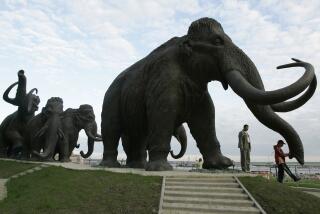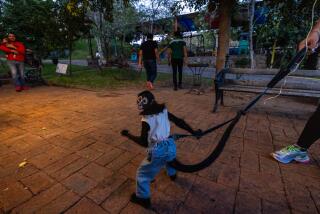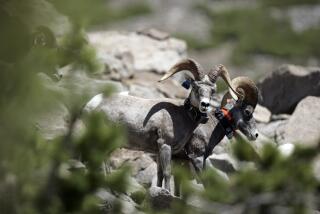Humans drive a rare salamander, and themselves, toward extinction
Well, here it is, or almost, the specter that environmental scientists warn about: that we wind up killing off the one creature that can save us as a species.
The ajolote, a 9-inch-long aquatic salamander, has been swimming around the waterways of Mexico City since before there was a Mexico City, since even well before the Aztecs. And it’s been a powerful symbol in the legends of ancient Mexico itself.
Now that long run may be coming to an end, as the canals of Xochimilco are too polluted, too full of non-native species and too degraded to support this ancient creature. In about 15 years, its population has plunged from tens of thousands to maybe 100. That is not a typo. One hundred. My colleague Richard Fausset writes all about it.
What do you care about some slimy, unprepossessing little critter in another country? Plenty. Or you should, if you care about yourself and your progeny on this planet.
Because the ajolote can regenerate lost legs, regrow heart cells and even fragments of its own brain. And if you don’t think that could have some application in the human biosciences, your own brain could use a tuneup.
Even if you don’t care a fig — or a Lompoc yerba santa, if you want a California endangered plant species — about what becomes of any other species on the planet; even if you think (idiotically) that human survival isn’t dependent on the survival of the chain of creatures great and small who share our ecosystem; even if you think that not all the polar bears and delta smelts and ivory-billed woodpeckers on Earth are worth saving if they inconvenience a single human being; even so, you’ve still got some skin in the preservation game.
The U.N. estimates that nearly 200 species — plant, bird, mammal, insect — go extinct every day. Nearly 10 every single hour. This is a collapse unseen since the dinosaurs started dropping in their formidable tracks.
And this is not the fallout of some meteorite. It’s the fallout from human activity. We ravage and despoil the Amazon to raise cattle for fast-food burgers. We poison and pillage ecosystems that are the only home to thousands of species, including rare and ancient species like the ajolote. We eat our own seed corn in every sense of the word.
And there’s every chance that the very species we just laid waste and sent blithely into extinction may be the very one that holds the key to save us from ourselves — perhaps like the ajolote.
Nice work, people of Earth.
ALSO:
FDA takes its time on genetically altered animals
Barry Commoner, early environmental stalwart, dies
Environmental aspects in MacArthur ‘genius’ grant awards
Follow Patt Morrison on Twitter @pattmlatimes
More to Read
A cure for the common opinion
Get thought-provoking perspectives with our weekly newsletter.
You may occasionally receive promotional content from the Los Angeles Times.











